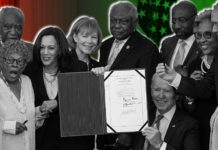“We must believe in the power and strength of our words. Our words can change the world.”—Malala Yousafzai
There are and have been countless women who have changed the world. We’ve learned about these influential women, not just during Women’s History Month, but consistently throughout our lives. Women like Oprah Winfrey, former First Lady Michelle Obama, and Vice President Kamala Harris. Malala Yousafzai. Rosa Parks. Serena Williams. Beyoncé. The list of influential women, and influential women of color, could comprise hundreds in any given industry or field, for the measure and impact of one’s life is connected to their influence and power.
Names we don’t always recognize as changing “lives” or “the world” are also ever present—people like Permit Patty, Offended Ophelia and Silencing Susan. No, these are not real names, but named representations of an identity—a persona that many women (knowingly or unknowingly) embody—the privileged voice of the white woman who attempts to silence others.
Many women of color, Black women in particular, have a shared experience that is mostly unspoken but completely life-changing—a time in their lives, career, profession or life’s work where they have been silenced by another woman—almost always a white woman. Those same influential women noted above, I’m sure, would all attest to a point in their lives where the impact and influence of their words triggered a space in someone else that resulted in a series of unfortunate events meant to silence and limit them and their impact. We most recently witnessed this with Megan Markle and unfortunately, this is almost like a rite of passage for women of color of influence.
While it may be unspoken in the dominant spaces, the silencing of the Black woman’s voice isn’t new—it isn’t a novelty concept that is just being discovered, nor is it foreign to the Black community. The complexities of being a Black woman is the topic of discussion anytime there are two or more Black women joined together. Throw in a few more women across industries who have acquired various levels of education and you’ll have a deeply moving conversation that is rich with anguish, discontentment, consciousness, affirmations and ultimately support.
If you were a fly on the wall, you’d hear women speak of circumstances and situations that may be different on the surface, but the exact same underneath. What lies underneath are the identical feelings of those women that can be loosely identified as fear …
The ever present knot in the pit of your stomach that rises and accumulates to a ball in your chest, that flutters your heart and sends your mind racing.
The enraging dichotomy that stops you in your tracks.
The moment when the essence of your existence and the weight of your calling hangs in the balance because of the fragility of the white woman’s self-esteem when she is faced with your words and your truth.
It’s the life changing moment when you recognize that living unapologetically is wrapped ever so tightly in fear.
The Black Experience is a beautifully woven tapestry of pride and resilience, purpose and connection to an internal and external fight for the advancement of Black people. It is the exhilaration of hope derived from the limitless possibilities of our collective action to the consistent fatigue of fighting for that same change to occur.
It is the glorious pleasure derived from our individual and collective accomplishments, resulting in living the statement, “I am my ancestor’s wildest dreams,” as well as the “humility” that sometimes must be exhibited in the presence of those who seek to oppress because they are intimidated by our light. Couple that with the glass ceilings and societal barriers that exist for Black women and you’ll find yourself understanding why the Chucks and Pearls movement was so important.
“When I dare to be powerful—to use my strength in the service of my vision, then it becomes less and less important whether I am afraid.” (Audre Lorde)
I learned early on that there is power in words. I attended an elementary school for gifted students that ensured we learned the etymology of words and the development and history of language. I indirectly learned how words attribute to the passing down of legacy and history, especially when words are used to document essential times and events in history. They were right—“the Revolution will not be televised,” but will live in the words that are written, spoken language immortalized on paper, left to impact the world.
Yes, I learned the importance of words in school, and I realized the importance of MY words as a young adult. My petitions changed policies in college. My speeches and presentations changed perceptions in the workplace. My thesis provided a foundation for future research. And most recently, my opinions sparked allegations of my competence.
Never mind the many letters behind my name, the earned degrees and decades of professional experience that informs my perspective, or my inalienable right to the First Amendment. Never mind the truth of my experience that deserves to be heard—a truth that is shared to promote critical and deep reflective thinking on the systemic and systematic subjugation that can only be transformed by the illumination of oppression that prevents forward movement in an exponential way. Never mind that I am charged to use my current place and position in life to reach back—for to whom much is given, much is required. Never mind that my existence is purposed for a time such as this to promote change.
The attempted silencing of the Black woman’s voice isn’t a concept that I speak of from hearsay—it is something that I’ve lived through. Numerous times. It doesn’t get any easier, either—for the audacity of the perceived right of the silencer only gets stronger as one elevates higher.
But I take pride in knowing I can walk in the footsteps of the women before me—Angela Davis, Shirley Chisolm, Bettina Love—who have illustrated an equal audacity to continue pressing, continue working and continue to elevate their voice.
Because you can only be silenced when you refuse to speak.










